Boynton Beach Addiction Treatment & Mental Health Resources Guide
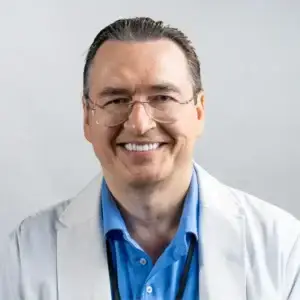
Dr. Rostislav Ignatov, MD
Chief Medical Officer
Boynton Beach—and Palm Beach County around it—is working through a complex mix of fentanyl-driven overdoses and growing behavioral health needs. The good news: accidental drug overdose deaths fell from 494 in 2023 to 315 in 2024 (≈36%), and opioid-involved accidental deaths fell from 390 to 242 (≈38%). That progress reflects sustained countywide prevention and response efforts, even as the need for treatment and recovery supports remains high.
Help is available today. Free naloxone (Narcan) is widely accessible locally—10,000+ kits have been distributed through the county’s public health clinics since July 2022—while 24/7 Mobile Response Teams provide on-scene crisis support anywhere in the county. Many public programs also offer counseling in English, Spanish, French, and Haitian Creole to reduce language barriers.
This guide explains exactly how to access addiction treatment, mental health counseling, peer recovery support, and crisis intervention services in Boynton Beach, helping residents navigate a robust, coordinated system across neighborhoods from Old Boynton to Gulfstream Ridge. It also highlights what to look for in professional treatment and how programs like The Haven Detox – Florida provide safe, comprehensive care in a supportive setting.
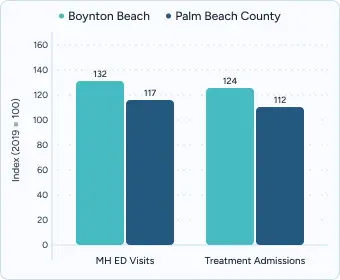
Data specific to Boynton Beach shows mental health–related emergency department visits among city residents increased by 32% between 2019 (820 visits) and 2024 (1,080 visits), outpacing the 17% rise observed county-wide over the same period. Boynton Beach also saw a 24% growth in substance-use treatment admissions—from 415 in 2019 to 514 in 2024—while overall Palm Beach County admissions climbed just 12%, highlighting a sharper local demand for both mental health and addiction services.
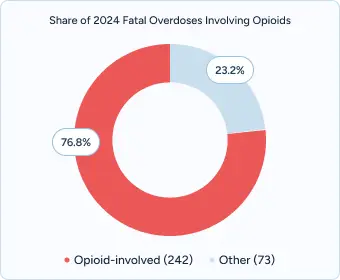
Palm Beach County’s fatal drug overdoses fell from 474 in 2019 to 315 in 2024 (~33% decline). In 2024, 242 of those deaths involved one or more opioids, and fentanyl/its analogs were most frequently identified in opioid-involved cases. Non-fatal burden remains substantial. County EDs recorded 8,325 suspected overdose visits in 2022 (-4.2% vs. 2021), and the DOH-Palm Beach OD2A dashboard shows ongoing monthly activity (e.g., 379 suspected overdoses in December 2024).
Local partners have expanded harm-reduction and monitoring: DOH-Palm Beach provides free naloxone (Narcan) and launched the Overdose Surveillance Dashboard to guide hotspot response, while the Health Care District reports distributing 10,000+ Narcan kits since July 2022.
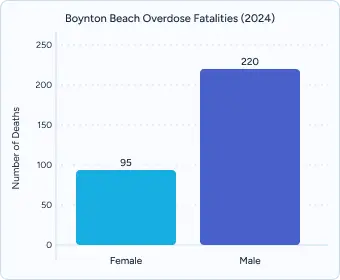
According to the Palm Beach County Medical Examiner, there were 315 accidental drug overdose deaths in 2024; 242 of these involved one or more opioids. Victims were predominantly male (≈2.3:1)—which, applied to the total, equates to about 220 men and 95 women. Fentanyl and its analogs were the leading opioids involved.
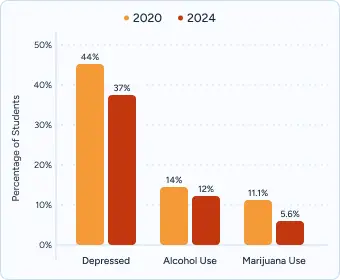
County surveys show self-reported mental health concerns and substance use among middle- and high-school students. In 2024, 37% of students reported feeling depressed or sad most days in the past year, down from 44% in 2020. Past-30-day alcohol use was 12% in 2024 (down from 14% in 2020), and past-30-day marijuana use was 5.6% in 2024 (down from 11.1% in 2020). Overall, Palm Beach County shows modest improvement since 2020—fewer teens report sadness most days and fewer are using alcohol or marijuana—but prevalence remains high enough to warrant sustained prevention, early screening, and strong school-based support.
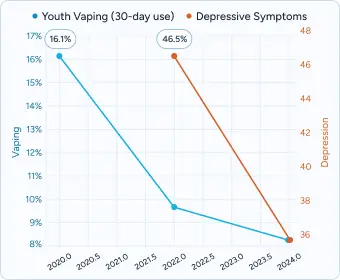
Palm Beach County trend lines show youth nicotine vaping falling—from 16.1% of high-school students reporting past-30-day use in 2020 to 9.7% in 2022 and 8.2% in 2024. Depressive symptoms remain high but have eased, with 46.5% of high-schoolers reporting they felt depressed or sad most days in 2022, compared with 35.6% in 2024. While county reports don’t cross-tab students who vape with those who report depression, national studies consistently find that teens who vape have nearly twice the odds of depressive symptoms versus non-users ( ≈ 1.9). Together, the local trends and national evidence underscore the need to pair nicotine-use prevention/cessation with accessible mental-health supports for youth in Boynton Beach and across Palm Beach County.

Delray/Palm Beach County Access to Recovery serves as a centralized entry point for treatment referrals and information. The program offers certified recovery peer navigators at community clinics and distributes over 8,500 naloxone kits county-wide in 2024, with nearly 1,200 provided directly to Boynton Beach residents.
The Southeast Florida Mobile Response Team provides 24/7 crisis intervention covering Boynton Beach, Delray Beach, and Lake Worth. With deployment hubs at 460 N Congress Ave and 1216 S Federal Hwy, the team offers on-site psychiatric evaluations, brief stabilization services, and transport to the Health Care District’s 16-bed Crisis Stabilization Unit.
Transportation access through Palm Tran connects all Boynton Beach neighborhoods to addiction treatment and mental health facilities. Route 1 links West Boynton to central outpatient programs, while Routes 94 and 97 serve Gulfstream Ridge and Ocean Ridge. Palm Tran Connection paratransit offers door-through-door service for riders with disabilities.
Florida Medicaid’s Statewide Medicaid Managed Care (SMMC) program covers medically necessary behavioral health services for eligible members, including medical detox, residential care when indicated, outpatient therapy, and medications for opioid use disorder (e.g., methadone delivered through Opioid Treatment Programs and buprenorphine when medically necessary).
Florida Medicaid and CHIP (through Florida KidCare): Children can receive mental health benefits through Florida KidCare (Medicaid/CHIP), while adults access services through Florida Medicaid if eligible. Residents can apply or renew benefits online through the Florida Department of Children and Families or by calling 1-866-762-2237 (multilingual assistance available).
Health Care District of Palm Beach County: The District’s C. L. Brumback Primary Care Clinics offer sliding-fee services, benefits counseling, and same-day mental health screenings from 7 a.m. to 7 p.m., seven days a week—with a “no one is turned away” policy.
When every moment counts, select private facilities in Boynton Beach offer seamless entry into personalized care—combining in-depth clinical assessments, medical detox, and cutting-edge therapies like trauma-informed therapies and neurofeedback.
Most centers finalize insurance approval within 24 hours and can secure same-day admissions when clinically indicated.
Nestled just minutes from the Atlantic coast, The Haven Detox – Florida combines expert medical detox, individualized clinical assessments, and a unique blend of evidence-based and holistic therapies. Guests benefit from traditional approaches like cognitive-behavioral therapy (CBT) and dialectical behavior therapy (DBT), alongside yoga, art therapy, and nature-based mindfulness sessions. Cutting-edge GeneSight® genetic testing personalizes medication plans, while one-on-one nursing and counseling ensure safety and support around the clock.
Admission is streamlined with free insurance verification and same-day placement when clinically appropriate.
Boynton Beach Behavioral Health Services Offer Multilingual, Trauma-Informed Care: Across Boynton Beach and neighboring communities, comprehensive mental health programs emphasize depression treatment, anxiety management, and trauma-informed care. The Health Care District’s community centers provide bilingual psychiatric services, while the Center for Trauma Counseling delivers culturally responsive therapy—including EMDR, family counseling, and integrated substance use support—across Palm Beach County.
Community-Based Providers Deliver Targeted Support: Caridad Center’s Behavioral Health Department offers psychiatric evaluations, case management, and pediatric mental health services, with Spanish-English clinicians serving predominantly Latino families. South County Mental Health Center provides sliding-scale children’s programming and adult services, using co-occurring disorder care models to address both mental health and substance use challenges in diverse neighborhoods.
Outpatient Therapy and Integrated Recovery Coaching: MoriMindful Therapy & Psychiatry delivers individual therapy, medication management, and ADHD assessments for youth and adults, with both in-person and telehealth options. MindSpa Psychiatry & Therapy focuses on adult mood disorders, PTSD care, and anxiety treatment via telemedicine. Meanwhile, Health Care District clinics integrate psychiatric assessments, medication-assisted treatment, and 24/7 recovery coaching to bridge gaps between mental health and substance use services.
Rebel Recovery Community Organization in West Palm Beach offers nonjudgmental, harm reduction services such as syringe exchange, infectious disease testing with healthcare navigation, and certified recovery peer support for individuals at any stage of their substance use journey.
Pear Place Support Center in West Palm Beach hosts nearly 100 monthly support groups on topics ranging from dual diagnosis to family healing, plus weekly AA and NA meetings. Peer mentors draw on personal recovery experiences to guide participants toward stability.
The Recovery Community HUB of Palm Beach County empowers long-term recovery through trauma-informed peer specialists and one-on-one recovery coaching, delivering proven, community-based support designed for sustained success.
Certified sober living homes in Boynton Beach provide structured, supportive environments following Florida Association of Recovery Residences (FARR) standards, with residents finding comprehensive directories through state alliance certification programs and local referral networks.
Seacrest Sober Living holds FARR certification and provides gender-specific housing for men and women in early recovery, offering 12-Step recovery residence programming with structured atmosphere, encouragement-based environment, and 24/7 support availability. The facility requires meeting attendance and maintains house rules supporting long-term recovery development.
Bright Futures Treatment Center operates certified transitional housing integrated with their treatment programming, providing seamless transition from residential care to independent living with continued clinical support and community integration assistance. Residents participate in local recovery community activities while maintaining structured recovery-focused living arrangements.
The Boynton Beach Alcoholics Anonymous Intergroup coordinates approximately 150 AA meetings each week across the city. These gatherings range from morning speaker sessions to evening discussion groups, with daily website updates and Meeting Guide mobile app listings to help newcomers and longtime members find meetings near them.
Narcotics Anonymous hosts around 60 weekly meetings citywide, including both closed and open formats. Meetings occur morning through night, with locations such as West Boynton Community Center and Gulfstream Ridge Park Pavilion. Schedules are updated daily on the Palm Beach Area NA website.
To serve the city’s diverse population, Boynton Beach offers Spanish-language AA and NA meetings on Tuesday and Thursday evenings, as well as a weekly Creole-speaking AA group. These meetings are held at community centers throughout West Boynton and Lake Ida neighborhoods and appear in both Intergroup and Meeting Guide listings.
Boynton Beach features an LGBTQ+-friendly AA meeting every Wednesday night, welcoming individuals of all orientations and gender identities. This group meets in a private room at the Boynton Beach Library Annex and is listed as “Gay and Lesbian Alcoholics Anonymous” on local schedules.
Top-tier recovery and mental health programs in Boynton Beach blend proven methods with compassionate, culturally attuned care.
Look for programs offering:
Robust medication-assisted treatment (MAT) options—such as buprenorphine, naltrexone, and methadone—paired with therapeutic counseling signal comprehensive addiction care.
Cultural fluency is vital in Boynton Beach’s mosaic of communities. Opt for providers who deliver bilingual services (English/Spanish), Haitian Creole support, and tailored programs for LGBTQ+ clients and other diverse groups to ensure inclusive, personalized healing.
Aftercare coordination should begin before discharge, seamlessly linking clients to outpatient therapy, peer-led support groups, and transitional sober living homes. Quality programs maintain ongoing partnerships with community recovery organizations and provide warm handoffs between levels of care for sustained engagement.
Family engagement and support enhances recovery outcomes through multi-family therapy sessions, educational workshops on addiction and healing, and culturally tailored services. Look for providers offering Spanish-language family groups, LGBTQ+-affirming counseling, and resources that honor each family’s unique background and needs.
Evidence-based professional treatment provides critical advantages over informal recovery attempts.
Medical Safety and Stabilization
Personalized Treatment Planning
Integrated Clinical Oversight
Recovery in Boynton Beach combines a variety of therapies and support to help you heal.
Trauma-informed care uses techniques like EMDR, body-based therapy, and mindfulness exercises. Staff are specially trained and get ongoing supervision to ensure you get safe, effective trauma treatment.
Alumni networks and follow-up care keep you connected after treatment with quarterly meet-ups, online support groups just for Boynton Beach grads, and quick access to counselors if you hit a rough spot.
Recovery navigation services help you sign up for benefits, see if you qualify for reduced fees, and connect you with local community support to tackle challenges like housing or transportation that affect your recovery.
Professional treatment represents an investment in recovery success, offering immediate access, personalized care, and comprehensive services designed to address the complex nature of addiction and mental health conditions.
Insurance verification typically completes within 24 hours, with many programs able to provide immediate preliminary coverage information. Financial counselors assist with understanding benefits, estimating out-of-pocket costs, and exploring payment options when needed.
Assessment and admission can occur rapidly when clinically indicated. Many facilities offer same-day assessment with next-day admission capability, ensuring minimal delay between making the decision to seek help and beginning treatment.
Most programs offer same-day assessments and next-day admission when clinically appropriate, with insurance verification typically completed within 48 hours.
Yes, Florida Medicaid covers medical detox, residential treatment, outpatient therapy, and medication-assisted treatment with copayments as low as $2.00.
Multiple facilities offer bilingual programming, including “Grupo El Milagro Continua” meetings and culturally responsive clinical services throughout Palm Beach County.
Several programs provide sliding-scale fees and state funding assistance, with Health Care District services available regardless of insurance status.
Many programs coordinate transportation assistance and some partner with rideshare services to provide free or low-cost transportation vouchers.
Crisis hotlines (211, 988) and mobile response teams operate 24/7, with trained specialists available for immediate mental health and substance abuse emergencies.
Yes, family peer specialists offer confidential coaching, Al-Anon referrals, intervention planning services, and educational workshops about addiction and recovery.
“We Are Not Saints” LGBTQ meeting meets Sundays at 7:00 PM, with additional affirming programs throughout Palm Beach County addressing unique community needs.
Several organizations offer age-specific programming for adolescents and young adults, including specialized outpatient services and peer support groups designed for college-aged individuals.
24/7 Support
No Commitment
100% Private
There’s no catch. Checking your insurance is simply a way to see what your plan covers — it doesn’t lock you into treatment, notify anyone, or cost you anything. You get answers upfront to decide what makes sense for you.
Protecting your privacy matters! No information or notifications are ever sent to your employer or family — whether you check your insurance online or call. Everything is handled through secure, encrypted systems that meet strict medical privacy laws. You stay in control of your information!
Luckily, most insurance policies cover treatment here. Depending on the healthcare you’ve already had this year, costs could even be zero. Instead of worrying, let’s just find out what your plan covers.
Most likely. We work with major providers like Cigna, Aetna, and United Healthcare, public insurances like Tricare and tribal plans, and even smaller plans like Surest Bind and Harvard Pilgrim. The quickest way to know for sure is to check online or call. It’s a quick, private way to understand what is covered upfront.
Verifying your insurance isn’t a commitment to start treatment — it’s simply a way to see what your options are. Knowing your coverage ahead of time helps you make more informed, confident decisions. It also helps flag a spot, so you’re able to get right in if you ever do decide you’re ready.
You need your policy number to check your specific policy online. If you want general information, just call. You likely have questions beyond insurance anyway. Reaching out now helps you figure out the right fit if or when you’re ready. You don’t have to put off the call until you’re in crisis. Calling is not scary, I promise!